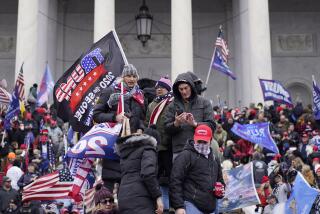Judge May Toss Out Payola Case Against Isgro : Entertainment: The defense claims that the prosecution withheld key documents.
- Share via
A federal judge in Los Angeles said Thursday that he will decide over the Labor Day weekend whether to dismiss the biggest payola trial in 30 years and bring an end to the government’s case against former record promoter Joseph Isgro and two other defendants due to claims that prosecutors improperly withheld key documents.
“What is clear is that there has been a violation,” said U.S. District Judge James M. Ideman. “Material that should have been turned over long ago was not turned over. . . . I have not decided what to do about it.”
Ideman could end the trial if he decides to dismiss the case “with prejudice,” meaning that the charges could not be refiled.
Ideman suspended the trial until Tuesday after being informed that six volumes of testimony given in an earlier trial by a key government witness, Dennis Di Ricco, had not been given to either the defense or the grand jury that indicted Isgro, former CBS Records executive Ray Anderson and Isgro associate Jeffrey Monka. Court rules require the prosecution to make available to a defendant any information that might aid in his defense.
The testimony of Di Ricco, an accountant and business associate of Isgro, was given in his own trial in U.S. District Court in San Francisco. He was convicted in that case on tax and obstruction of justice charges. But lawyers for Isgro and his co-defendants claim that in 74 instances, Di Ricco gave testimony in the San Francisco case that contradicts statements he later made before the Los Angeles grand jury.
“Nearly every key allegation made . . . (is) contradicted by his sworn testimony in San Francisco,” said Isgro’s attorney, Donald M. Re, outside the courtroom Thursday.
The federal prosecutors in the case, William S. Lynch and Drew Pitt, left court without comment and did not return a later call seeking comment about the trial’s turn of events.
The stunning development in the five-year-long payola, mail fraud and racketeering case came in the second week of the high-stakes trial, which has been widely followed by the radio and recording industries. The case has also received unusually close supervision from the Justice Department, which dispatched Lynch, its senior litigation counsel, to Los Angeles from Washington to lead the prosecution.
Isgro, one of the most powerful and controversial record promoters of the 1980s, is accused of making cash payments to radio station employees in California and Texas in exchange for their promises to broadcast certain records promoted by Isgro.
He is also charged with supplying radio station program directors with cocaine.
Isgro, Anderson and Monka have pleaded not guilty to all charges.
Defense lawyers first became aware of the withheld documents after Lynch reportedly let slip that he had more specific information about a money laundering scheme in which Isgro’s bodyguard, David Michael Smith, allegedly acted as a courier between Isgro and Di Ricco. Smith testified in court on Tuesday and Wednesday that in the mid-1980s he had made several trips between San Francisco and Los Angeles to pick up briefcases containing between $60,000 and $100,000 in cash.
Monka’s attorney, Gerson S. Horn, uncovered the court documents that conflict with Di Ricco’s grand jury testimony. In a conference in Judge Ideman’s chambers, he questioned Lynch further about the laundering scheme. “I thought Di Ricco denied he ever gave cash to Smith,” Horn said.
“No,” Horn recalled prosecutor Lynch responding, “he didn’t give cash in 1983.” With that statement, “we knew the government had lied,” Horn said.
If the transcript of the San Francisco trial is determined to contradict the Los Angeles grand jury testimony from Di Ricco, Ideman said he may dismiss the government’s case “with prejudice.”
One key issue, Ideman said, will be whether “Isgro could be indicted in the absence of” the questioned testimony. If the case is dismissed, prosecutors could appeal. If Ideman’s ruling is overturned, the defendants could then be retried.
More to Read
The biggest entertainment stories
Get our big stories about Hollywood, film, television, music, arts, culture and more right in your inbox as soon as they publish.
You may occasionally receive promotional content from the Los Angeles Times.










